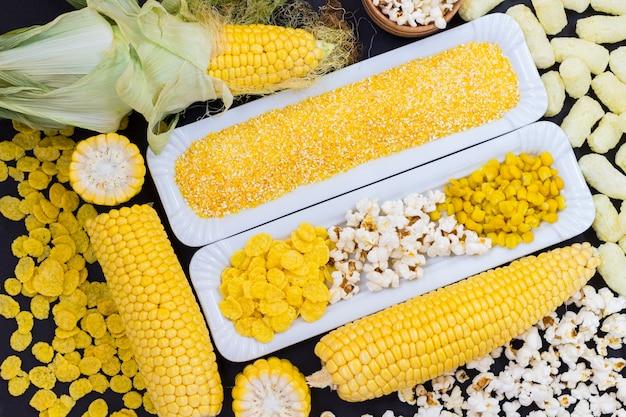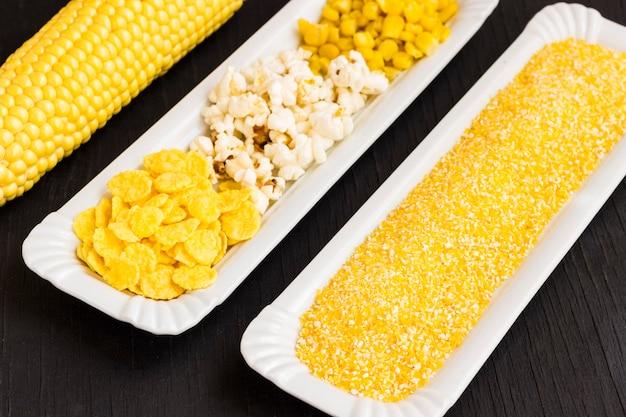Maize, also known as corn, is a versatile crop that has been cultivated for centuries. It is not only used as a food source but also plays a significant role in various industries. In this blog post, we will explore the different products that are made from maize and how they contribute to our daily lives.
From the moment we wake up until we go to bed, maize products are often an integral part of our daily routines. Whether it’s the cereal we have for breakfast, the corn oil we use for cooking, or even the ethanol that powers our vehicles, maize has found its way into a wide range of items. But it doesn’t stop there – from cosmetics to pharmaceuticals, maize-derived ingredients can be found in numerous products we use every day.
In this post, we will dive deeper into the world of maize and discover the unexpected places where it can be found. Join us as we explore the fascinating array of products that owe their existence, in part, to this humble grain. So, let’s dig in and uncover the fascinating world of maize-derived products!

What Type of Products are Made from Maize?
Maize, also known as corn, is an incredibly versatile crop that is used to create a wide variety of products in the United States. From food and beverages to industrial materials, maize has found its way into countless everyday items. Let’s take a closer look at some of the fascinating products that are made from this humble grain.
Food Products 🌽🍔
Maize is a staple ingredient in the American diet, and it plays a significant role in the production of various food products. One of the most beloved uses of maize is in the form of tortillas, which serve as the foundation for delicious tacos, enchiladas, and quesadillas. Cornmeal, derived from maize, is used in countless baked goods like cornbread, corn muffins, and even pancakes.
If you’re a popcorn lover, you have maize to thank for those fluffy, delicious kernels that make movie nights so enjoyable. And let’s not forget about corn chips, corn cereals, corn oil, and corn syrup, all of which have become pantry staples for many Americans.
Beverages 🥤🌽
Maize doesn’t just satisfy our hunger; it also quenches our thirst in some surprising ways. One popular maize-based beverage is bourbon, a type of whiskey that is distilled from a mash that contains at least 51% corn. Bourbon has been a beloved American spirit for centuries, and the distinctive sweetness derived from the maize gives it a unique flavor profile.
Even some beers make use of maize. American-style lagers often include corn as an adjunct grain, which helps lighten the body and adds a touch of sweetness to the brew. So, the next time you enjoy a cold beer or a glass of bourbon, appreciate the contribution of maize to your drinking pleasure.
Industrial and Household Products 🏭🌽
Maize extends its influence beyond the kitchen and into various industrial and household products. Manufacturers have discovered that maize can be used to produce bioplastics, which are eco-friendly alternatives to traditional plastics. These bioplastics can be found in items like disposable cutlery, packaging materials, and even clothing fibers.
Maize is also transformed into ethanol, a renewable fuel source that is blended with gasoline to reduce emissions. You may have seen E85 fuel at gas stations, which contains 85% ethanol derived from maize. Using this cleaner-burning fuel helps reduce carbon emissions and promotes a greener future.
In addition, maize contributes to the production of adhesives, paper products, and animal feed. So, the next time you use tape to wrap a gift or read a newspaper, take a moment to appreciate the versatility of maize.
Fun Fact: Maize Mazes 🌽🌽
Amidst the various practical applications of maize, there is also room for a bit of corny entertainment. Maize mazes, also known as corn mazes, have become a popular attraction in many rural areas of the United States. These intricate mazes are created by cutting winding pathways into large fields of maize, challenging visitors to find their way out.
Corn maze designs can range from simple shapes to elaborate themes, making for an enjoyable and family-friendly outdoor adventure. So, if you’re looking for a unique and amusing way to spend your day, a maize maze might just be the answer!
In conclusion, maize is undoubtedly more than just a simple grain. It plays a crucial role in the production of food, beverages, industrial materials, and even recreational activities. Next time you grab a tortilla or sip on some bourbon, take a moment to appreciate the corny goodness that maize brings to your daily life!
Note: All information provided in this blog post is accurate as of 2023.

Frequently Asked Questions about Maize Products
What type of products are made from maize
Maize, commonly known as corn, is a versatile grain that is used in a wide range of products. From everyday foods to industrial materials, maize plays a significant role in various industries. Here are some common maize products:
- Cornmeal: Ground maize that is used for making cornbread, tortillas, and other baked goods.
- Cornstarch: A fine powder derived from maize, used as a thickening agent in soups, sauces, and desserts.
- Corn oil: Extracted from maize germ, this oil is used in cooking, frying, and as a base for salad dressings.
- Corn syrup: A sweetener made from cornstarch, commonly used in the food industry.
- Corn flakes: Popular breakfast cereal made from toasted maize flakes.
- Tortilla chips: Crispy chips made from maize flour, perfect for dipping in salsa or guacamole.
- Corn tortillas: Traditional Mexican flatbread made from maize dough, used in a variety of dishes like tacos and enchiladas.
- Popcorn: Maize kernels that expand and “pop” when heated, making it a beloved snack at movie theaters and home movie nights.
Does apple cider vinegar have corn in it
No, apple cider vinegar is not made from corn. It is produced by fermenting the juice of apples. Apple cider vinegar has a variety of uses, including cooking, salad dressings, and natural remedies.
What cereals are corn-free
If you’re looking for corn-free cereal options, you’re in luck! Here are some popular corn-free cereal choices:
- Rice cereal: Made from rice grains, it is a common alternative for those with corn allergies or intolerances.
- Oat cereal: Oats are naturally gluten-free and can be found in various cereal options.
- Quinoa cereal: Quinoa is a nutritious grain that can be enjoyed as a cereal, providing a great corn-free option.
- Buckwheat cereal: Despite its name, buckwheat is not related to wheat and is a suitable corn-free alternative for cereal lovers.
- Millet cereal: Millet is a small grain that can be used to make corn-free cereals with a mild, nutty flavor.
Check the product labels or look for cereals specifically labeled as corn-free to ensure you’re making the right choice for your dietary needs.
Does oatmeal have corn in it
No, oatmeal does not naturally contain corn. Oats are a separate grain that is gluten-free, and pure, unadulterated oatmeal should not contain any corn. However, it’s essential to check labels for any potential cross-contamination if you have severe corn allergies or sensitivities.
Is Zein a gluten
No, Zein is a protein derived from corn. While it is gluten-free, it is not recommended for individuals with corn allergies or sensitivities. Zein is commonly used in the production of certain food coatings, films, and capsules.
What corn products contain Zein
Zein can be found in various corn-based products, including:
- Corn-based coatings: Zein is often used as a natural coating for foods such as candies, nuts, and chewing gum to enhance their appearance and shelf life.
- Corn-based films: Zein is utilized in the production of edible films, which can be used to wrap or encase certain food products to protect them from moisture and extend their shelf life.
- Corn-based capsules: Zein is often used as an alternative to gelatin in the production of vegetarian or vegan capsules, providing a plant-based option for encapsulating medications or supplements.
What foods have Zein in them
While Zein itself is not a common ingredient found in everyday foods, it can be present in processed food products due to its use as a coating or film. Some candies, coated nuts, or chewing gum might contain Zein as an ingredient. It’s always a good idea to check the food labels if you have specific dietary concerns or restrictions.
I hope these FAQs have answered your questions about maize products. If you have any further inquiries, feel free to ask!
